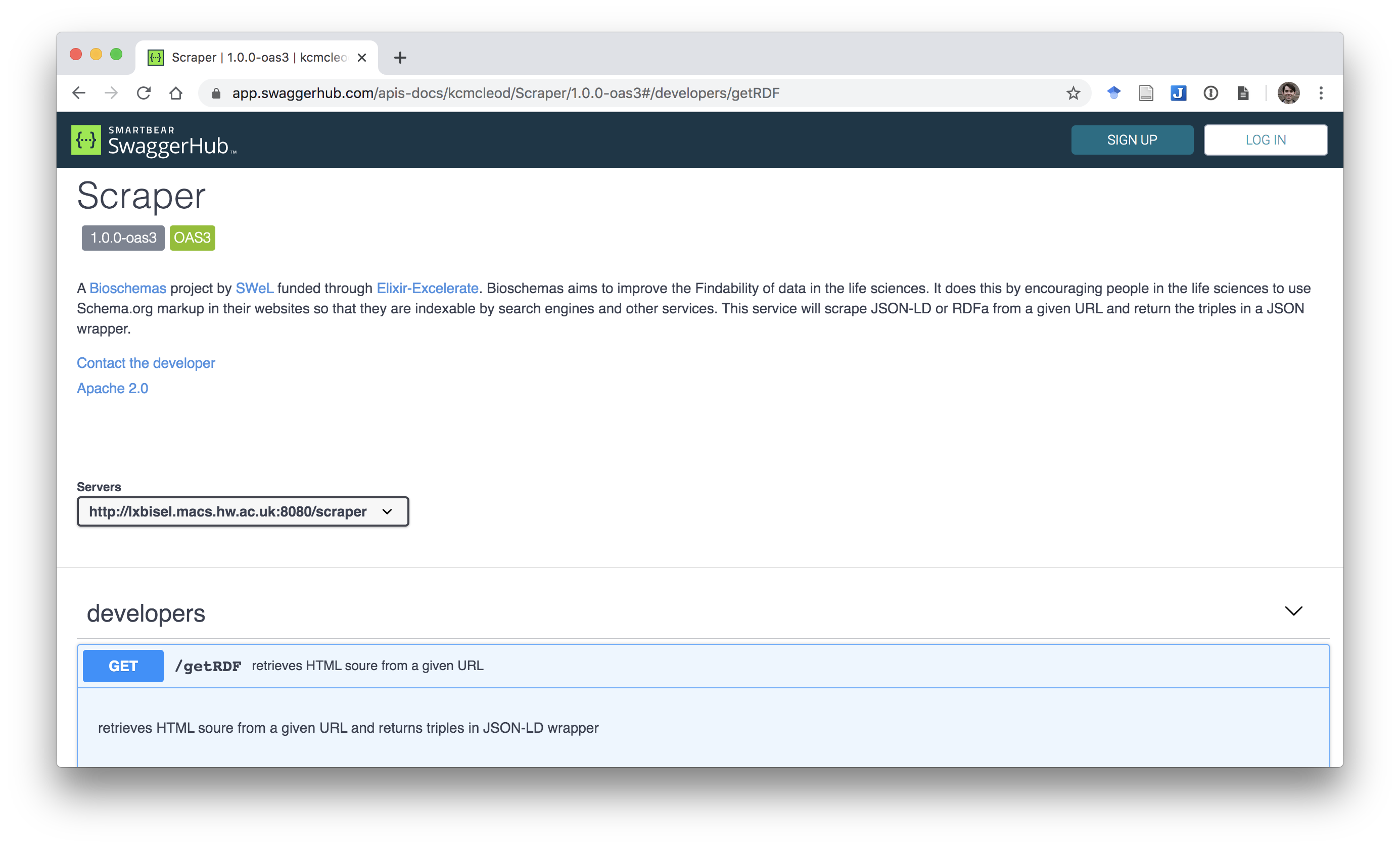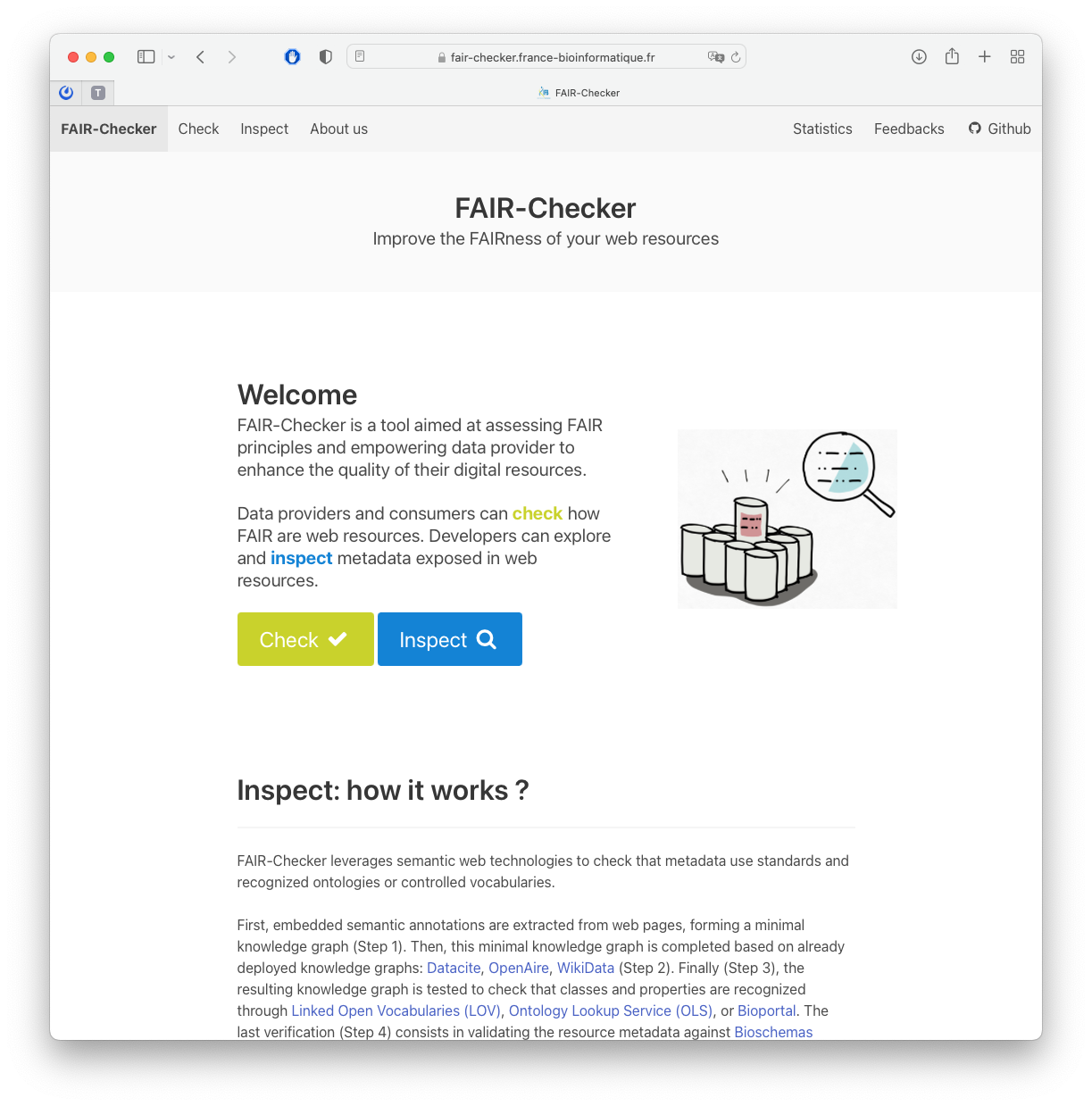Software
This is a list of software that can help you generate, consume or otherwise work with Bioschemas markup. If you have such software and you’d like to list it here, please email us at enquiries@bioschemas.org.
Note:
help us keep the above list updated: Join the community and/or create a pull request on the bioschemas github community project.
Bioschemas Generator (deprecated)
 for prototyping markup against the Bioschemas [profiles](https://bioschemas.org/profiles/).](/images/bioschemasGenerator.png)
A web application for prototyping markup against the Bioschemas profiles.
Description
This deprecated web application supported users in the creation of Bioschemas compliant markup required for inclusion on their web resource. Bioschemas provides profiles for Schema.org mark-up in order to structure and expose life-sciences metadata on the web. Each profile brings a list of allowed attributes with their constraints and properties. Some attributes are required, some are composite, some allow multiple values, some are under controlled vocabularies, and some can even be all of that.
The Bioschemas Generator is a web application that assists users in the creation of their metadata structure, through dynamically generated forms, allowing easier development of Bioschemas compliant markup for web resources.
People
Links
Data Discovery Engine (DDE) Schema Playground

A tool for generating, customizing, and maintaining schemas in JSON-schema/JSON-LD format.
Description
The Data Discovery Engine provides guidance for researchers on how to make their data discoverable and reusable, and bring the practical benefits of data sharing to researcher’s own research projects, as well as the research community as a whole. It was developed and is maintained by Dr. Chunlei Wu’s lab at the Scripps Research Institute and is supported by funding from the National Center for Data to Health (CD2H). The Schema Playground provides a set of tools for expressing Schema.org and Schema.org-derived specifications in JSON-schema/JSON-LD compatible formatting for registration in the DDE Schema Registry. The metadata validator allows users to validate JSON-LD/JSON Schema-formatted metadata against a registered schema. The Markup Generator converts registered schemas into a fillable form for generating markup in JSON-LD/JSON-schema format.
People
Links
Issues for the DDE Schema Playground can be submitted to its public repository
Data Discovery Engine (DDE) Markup Generator

A tool for generating JSON Schema/JSON-LD-formatted metadata markup based on registered schemas like Bioschemas profiles and types.
Description
The Data Discovery Engine provides guidance for researchers on how to make their data discoverable and reusable, and bring the practical benefits of data sharing to researcher’s own research projects, as well as the research community as a whole. It was developed and is maintained by Dr. Chunlei Wu’s lab at the Scripps Research Institute and is supported by funding from the National Center for Data to Health (CD2H). The Schema Registry allows users to browse and compare specifications from Schema.org, Google, BioLink, NIAID, and more. The Schema Viewer allows users to visualize specifications in JSON-LD/JSON-Schema format by entering the url or GitHub link to the jsonld file of the specification. The metadata validator allows users to validate JSON-LD/JSON Schema-formatted metadata against a registered schema. The Markup Generator converts registered schemas into a fillable form for generating markup in JSON-LD/JSON-schema format.
People
Links
Issues for the DDE Schema Playground, Registry, and Viewer can be submitted to its public repository
BMUSE: Bioschemas Markup Scraper and Extractor (deprecated)

A scraper for extracting Bioschemas markup embedded in web sites.
Description
BMUSE is a deprecated directed scraping framework capable of extracting JSON-LD and RDFa markup from static and single page application sites. Markup is returned in a variety of RDF formats together with metadata about when the markup was extracted and from where.
BMUSE can be deployed as a scraping service. As input it takes a list of URLs or sitemaps. We have deployed a version to do a daily scrape of sites known to contain data relevant to COVID-19. You can get the data from here.
People
Links
Try it out using our Swagger Hub deployment
Get the code from GitHub
Data Discovery Engine (DDE) Schema Registry

A tool for browsing and viewing Schema.org specifications and Schema.org-derived specifications developed by other communities.
Description
The Data Discovery Engine provides guidance for researchers on how to make their data discoverable and reusable, and bring the practical benefits of data sharing to researcher’s own research projects, as well as the research community as a whole. It was developed and is maintained by Dr. Chunlei Wu’s lab at the Scripps Research Institute and is supported by funding from the National Center for Data to Health (CD2H). The Schema Registry allows users to browse and compare specifications from Schema.org, Google, BioLink, NIAID, and more. The Schema Viewer allows users to visualize specifications in JSON-LD/JSON-Schema format by entering the url or GitHub link to the jsonld file of the specification. The metadata validator allows users to validate JSON-LD/JSON Schema-formatted metadata against a registered schema. The Markup Generator converts registered schemas into a fillable form for generating markup in JSON-LD/JSON-schema format.
People
Links
Issues for the DDE Schema Playground, Registry, and Viewer can be submitted to its public repository
Schema.org Validator
A validator provided by Schema.org that checks the syntax of deployed markup against the defined Schema.org types.
Description
An online validator that can either retrieve a page from a specified URL or use pasted markup. The markup can be in any markup format and is checked against the Schema.org defined types.
Note that Bioschemas defined types and properties will be highlighted as an error since these have not yet been included in the Schema.org vocabulary. The validator can still be used to determine that markup is retrievable and syntactically correct.
Also note that the validation is only against the defined types and properties. The tool is not aware of the Bioschemas profiles and does not check against for these restrictions.
People
Dan Brickley, Schema.org Chair/Google
Links
FAIR-Checker: improve the FAIRness of your web resources

A metadata validation and inspection service leveraging Bioschemas profiles.
Description
FAIR-Checker is a tool aimed at assessing FAIR principles and empowering data provider to enhance the quality of their digital resources.
Data providers and consumers can check how FAIR are web resources. Developers can explore and inspect metadata exposed in web resources.
People
Links
Try it out at https://fair-checker.france-bioinformatique.fr deployment
Get the code from GitHub
Bioschemas Validator (WIP)
A work-in-progress online Bioschemas validator for checking markup against Bioschemas profiles.
Description
An online validator similar to the schema.org validator that can retrieve a page from a URL, follow a sitemap, or parse pasted markup, but it checks against Bioschemas profiles rather than just schema.org.
It outputs a report listing what fields were invalid or missing from each of the Minimum, Recommended and Optional field sets from the detected Bioschemas profile.
This validator began life as a student project and is looking for maintainers to help address some of the outstanding issues and incomplete functionality.
People
Yazhuo Cao, University of Manchester student
Links
Code available on GitHub
Data Discovery Engine (DDE) Metadata Validator

A tool for validating JSON Schema/JSON-LD-formatted metadata againster registered schemas like Bioschemas profiles.
Description
The Data Discovery Engine provides guidance for researchers on how to make their data discoverable and reusable, and bring the practical benefits of data sharing to researcher’s own research projects, as well as the research community as a whole. It was developed and is maintained by Dr. Chunlei Wu’s lab at the Scripps Research Institute and is supported by funding from the National Center for Data to Health (CD2H). The Schema Registry allows users to browse and compare specifications from Schema.org, Google, BioLink, NIAID, and more. The Schema Viewer allows users to visualize specifications in JSON-LD/JSON-Schema format by entering the url or GitHub link to the jsonld file of the specification. The metadata validator allows users to validate JSON-LD/JSON Schema-formatted metadata against a registered schema. The Markup Generator converts registered schemas into a fillable form for generating markup in JSON-LD/JSON-schema format.
People
Links
Issues for the DDE Schema Playground, Registry, and Viewer can be submitted to its public repository

